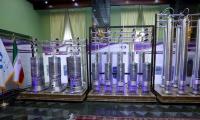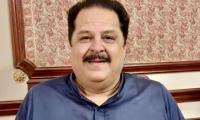PESHAWAR: Speakers on Thursday paid rich tribute to the Awami National Party (ANP) leader and former senior parliamentarian, Asfandyar Wali Khan, for his struggle for the rule of law, justice, democracy, provincial autonomy and regional stability.
Addressing a seminar on “Asfandyar Wali Khan - a living legend” held to honour the nationalist leader, ANP central president Aimal Wali Khan, former chief minister Ameer Haider Khan Hoti, secretary general Dr Muhammad Saleem Khan, provincial president Mian Iftikhar Hussain, and other senior leaders, politicians, journalists, educationists, and intellectuals said that Asfandyar Wali had a legacy of persistent political struggle for constitutionalism and nourishment of democratic values in the country.
The seminar was organised at the residence of ANP leader Syed Masoom Shah Bacah in Shabqadar tehsil in Charsadda district.Ameer Haider Hoti shed light on Asfandyar Wali Khan’s political journey, which began in 1990 when he was elected to the Khyber Pakhtunkhwa Assembly. He recalled that in the 1993 elections, senior party leaders urged him to contest for the National Assembly, where he secured a seat and earned widespread respect. “He not only uplifted his own stature but also that of the ANP and the red flag,” Hoti remarked.
He said Asfandyar Wali was a great example of simplicity and a staunch supporter of human rights besides having an unwavering commitment to democratic norms.Hoti lauded Asfandyar Wali’s leadership, particularly during his tenure as a chief minister in 2008, saying that despite immense challenges, he upheld the trust placed in him by the party. “Unlike other political leaders, Asfandyar Wali never interfered in provincial affairs,” he said.
During the Swat peace agreement, he said the nationalist leader resisted external pressure from global powers and upheld provincial autonomy. “A US diplomat tried to dissuade him from the agreement, but he firmly stated that Ameer Haider Hoti knew best how to govern Khyber Pakhtunkhwa,” he said.
When the agreement failed, he ensured that the provincial government was not unfairly blamed, asserting that the decision had been a collective one between the federal and provincial governments.
“During critical meetings with the prime minister and president, while others discussed various issues, he focused solely on provincial autonomy. He made the 18th Amendment a reality,” Hoti remarked.
Former Home secretary Syed Akhtar Ali Shah underscored Asfandyar Wali’s commitment to peace and constitutionalism. He said that following the 9/11 attacks, when terrorism engulfed Khyber Pakhtunkhwa, Asfandyar Wali, in coalition with the Pakistan People’s Party, restored stability.
“He always stood as a bridge between the constitution and the government, advocating for regional peace,” he noted. Akhtar Ali Shah added that Asfandyar Wali Khan was a proponent of strong bilateral ties with neighbouring countries, stressing that Pakistan should build robust relations with Afghanistan, China, Iran, and India.
He recalled that in 2006, Asfandyar Wali proposed a Grand Jirga for Pashtun peace and had advised the US to involve the Afghan government in negotiations with the Taliban, a recommendation that went unheeded.
The seminar also highlighted his efforts in education and research. A renowned educationist Dr Fazal Rahim Marwat said that Asfandyar Wali was born in 1949, the same year Pakistan passed the Objectives Resolution, and that he played a key role in national reconciliation. He was instrumental in expanding Bacha Khan Markaz, establishing a library with over 4,500 books, some unavailable elsewhere in Pakistan, and founding the Bacha Khan Research Centre to promote scholarly discourse through study circles and international seminars.
Speakers credited Asfandyar Wali for his role in securing the 18th Amendment, emphasizing his unwavering stance on provincial rights. They said his vision extended beyond Pakistan, as he advocated for Pakistan to adopt a genuine foreign policy that emphasized regional cooperation and economic integration. He often argued that Pakistan should pursue trade relations with India and establish a framework similar to the European Union for South Asia.
The ceremony concluded with a renewed commitment to continue the legacy of Asfandyar Wali, whose contributions to democracy, peace, and Pashtun rights were acknowledged as unparalleled.
Advisor to KP Chief Minister on Information and Public Relations, Barrister Muhammad Ali Saif gestures during a...
Punjab University building seen in this image. — APP/FileLAHORE: Punjab University administration has taken action...
Representational image of policemen in Baluchistan standing alert. — AFP/FileHANGO: Regional Police Officer Zeeshan...
This image shows a number of social media platforms on a phone screen. — X@AFP/File MANSEHRA: People from various...
Former federal minister Muhammad Ali Durrani speaks at an event. — X/@YouthPPakistan/FileBAHAWALPUR: Senior...
Qaumi Watan Party chairman Aftab Ahmad Khan Sherpao speaks at a gathering at the Watan Kor on October 17, 2024. —...







